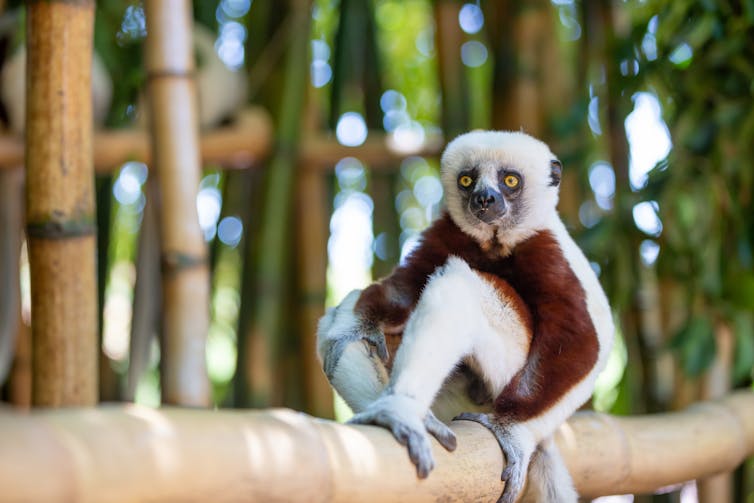The COVID-19 pandemic is affecting conservation efforts in Madagascar
 The Coquerel Sifaka in its natural environment in a Malagasy national park.
Eugen Haag/Shutterstock
Estelle Razanatsoa, University of Cape Town
The Coquerel Sifaka in its natural environment in a Malagasy national park.
Eugen Haag/Shutterstock
Estelle Razanatsoa, University of Cape Town
The effects of the COVID-19 pandemic, and the restriction policies used to mitigate the spread of the virus, are being felt all over the world. It affects all parts of life including conservation especially in developing countries like Madagascar.
Madagascar’s natural environment faces multiple challenges. These include deforestation, erosion, a changing climate, agriculture fires,
hunting and the over-collection of animals and plants from the wild. One of the biggest hurdles, which exacerbates these issues, is that poverty is widespread in Madagascar. It’s estimated that 75% of people in Madagascar live on less than $1.90 per day, and so many depend on natural resources.
There are about 500 conservation projects which are trying to address these challenges and provide employment to local communities.
I collaborated with a group of conservation managers and researchers, mostly from Madagascar, to assess exactly how the pandemic has affected conservation activities. Our paper is based on our personal experiences and involvement in establishing management strategies during the pandemic.
We found that the pandemic challenged existing conservation structures and management. The issue is that most of Madagascar’s conservation and research projects are conceptualised and funded from abroad – the Global North. Non-governmental organisations on the ground implement their activities with the help of communities living close to protected areas.
Because of COVID-19 travel restrictions, several activities were forced to stop. This included vital training and biodiversity monitoring.
This situation provides us with the opportunity to re-examine strategies and research approaches to build resilience for future crises. The foundation of which lies with the true empowerment of local communities, conservationists and researchers.
Challenges and coping strategies
Our research involved members of organisations that manage multiple sites and protected areas across Madagascar. These included WWF Madagascar, the Aspinall Foundation, the Missouri Botanical Garden in Madagascar and the Madagascar National Parks. The type of activities they carry out include both research and conservation.
Prior to the pandemic, activities were directed and funded by local and international agencies. Although there are initiatives that emerged locally, typically foreigners would lead and manage the projects. Malagasies (often those that live around the conservation areas) were usually employed to take on basic roles. For instance as project assistants, field guiding and patrolling. These activities provided them with an additional income to subsistence agriculture.
We found that restrictions, taken to reduce the spread of the new coronavirus, had a dramatic effect on conservation and research activities. Travel from abroad and within the country reduced the ability of projects to conduct activities. Foreigners, who were running projects, couldn’t come in. And there were also challenges managing activities from the capital, Antananarivo.
Border closures also meant international tourists and researchers couldn’t come into Madagascar. This resulted in less financial resources for conservation activities. For instance, park entrance and research permit fees are often used to fund conservation activities such as surveillance activities. They also provide park guides with an income.
In addition to a loss of income, in some cases project costs grew. This was because staff had to work from home, which increased communication expenses, and because local communities needed to report to head offices using phones. There were also additional costs related to health safety measures, such as masks and sanitisers.
Because there’s less surveillance activity, and also because many communities living close to protected areas had lost their supplementary income, there’s been an increase in illegal activities inside some national parks. This includes more hunting, logging and charcoal production.
In addition, environmental education and awareness activities for local communities living around protected areas ceased.
Not all local communities lost their work. In some places local communities were relied on to continue conservation and research activities, like reforestation and forest surveillance. But, because they weren’t adequately trained, this compromised the project.
Forest rangers, usually accompanied by permanent staff, had to perform habitat and species monitoring alone. But they faced challenges. This relates mostly to the transfer or proper storage of monitoring data because of the lack of technological knowledge and reduced connectivity in some remote sites.
Improving the model
All of these insights make a strong case for a change in Madagascar’s conservation model. In recent years, scientists and researchers have argued that locally-based conservation activities are more resilient as they engage and provide benefits to local communities.
Our paper supports this. Projects should be more independent so that they can continue to run without such a heavy reliance on human resources from abroad. More needs to be done to ensure that the workforce is predominantly local, and driven by locals.
Projects should also provide leadership opportunities to local managers and researchers.
Communities living near protected areas have benefited from the efforts of NGOs and conservation organisations. However, such an approach should include possibilities for diversifying livelihoods that take into account local needs and values.
We hope that the lessons we have learned in Madagascar during COVID-19 will help to drive conservation and research in developing countries towards a more inclusive, sustainable, and equitable model. This would help to improve the success of conservation activities.
Estelle Razanatsoa, Postdoctoral Fellow, Plant Conservation Unit (PCU), University of Cape Town
This article is republished from The Conversation under a Creative Commons license. Read the original article.